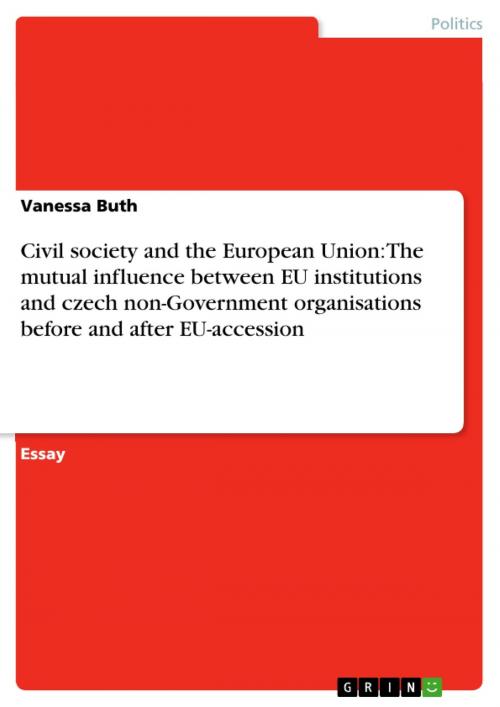Civil society and the European Union: The mutual influence between EU institutions and czech non-Government organisations before and after EU-accession
Nonfiction, Social & Cultural Studies, Political Science, International, International Relations| Author: | Vanessa Buth | ISBN: | 9783638580472 |
| Publisher: | GRIN Publishing | Publication: | December 15, 2006 |
| Imprint: | GRIN Publishing | Language: | English |
| Author: | Vanessa Buth |
| ISBN: | 9783638580472 |
| Publisher: | GRIN Publishing |
| Publication: | December 15, 2006 |
| Imprint: | GRIN Publishing |
| Language: | English |
Essay from the year 2006 in the subject Politics - International Politics - Region: Eastern Europe, grade: 1,0, Charles University in Prague (Social Sciences), 41 entries in the bibliography, language: English, abstract: Since the fall of communism CEE countries are undergoing a revival of civil society, also referred to as the 'third sector', which emerged after restrictions imposed under the communist party were abolished. The concept of civil society in its broader sense is the part of a society that exists next to state and market, the London school of Economics Civil Society department refers to it as 'the arena of uncoerced collective action around shared interests, purposes and values.' This collective action is formed by voluntary civic and social organisations or institutions referred to as non-profit organisations (NPOs) and non-governmental organisations (NGOs). This phenomenon is of high interest considering the current European wide dispute over the role civil society should have next to government and business. European institutions have been trying to enhance the development of NGOs in Central and Eastern European (CEE) countries through financial as well as institutional help. The EU enlargement was assumed to even further encourage the development of NGOs in CEE countries. Thus, the Czech Republic, one of the first aspirants of the CEE countries entering the EU, is considered to be a prime example to show how the mutual relation between the non-governmental sector in CEE countries and the EU institutions developed. To be able to define the politics and policies for future assistance of the European Union to CEE NGOs, two aspects are of special importance. One, it is necessary to understand the success NGOs in CEE countries have had in terms of succeeding to promote their interests in EU decision-making before and after the accession. Second, it is crucial to determine the role the European Union has played in the achievement of their goals.
Essay from the year 2006 in the subject Politics - International Politics - Region: Eastern Europe, grade: 1,0, Charles University in Prague (Social Sciences), 41 entries in the bibliography, language: English, abstract: Since the fall of communism CEE countries are undergoing a revival of civil society, also referred to as the 'third sector', which emerged after restrictions imposed under the communist party were abolished. The concept of civil society in its broader sense is the part of a society that exists next to state and market, the London school of Economics Civil Society department refers to it as 'the arena of uncoerced collective action around shared interests, purposes and values.' This collective action is formed by voluntary civic and social organisations or institutions referred to as non-profit organisations (NPOs) and non-governmental organisations (NGOs). This phenomenon is of high interest considering the current European wide dispute over the role civil society should have next to government and business. European institutions have been trying to enhance the development of NGOs in Central and Eastern European (CEE) countries through financial as well as institutional help. The EU enlargement was assumed to even further encourage the development of NGOs in CEE countries. Thus, the Czech Republic, one of the first aspirants of the CEE countries entering the EU, is considered to be a prime example to show how the mutual relation between the non-governmental sector in CEE countries and the EU institutions developed. To be able to define the politics and policies for future assistance of the European Union to CEE NGOs, two aspects are of special importance. One, it is necessary to understand the success NGOs in CEE countries have had in terms of succeeding to promote their interests in EU decision-making before and after the accession. Second, it is crucial to determine the role the European Union has played in the achievement of their goals.















